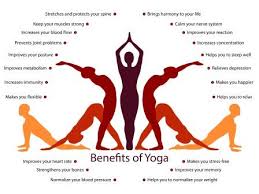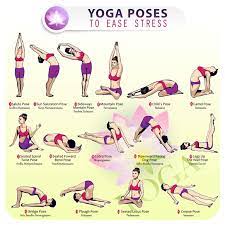Yoga is a holistic practice that combines physical movement, breathwork, and meditation to promote physical health, emotional wellbeing, and spiritual growth. While many people are familiar with the physical benefits of yoga, such as increased flexibility, strength, and balance, fewer people are aware of the benefits of yoga for mental health.
Research has shown that yoga can be an effective complementary therapy for various mental health conditions, including anxiety, depression, post-traumatic stress disorder (PTSD), and addiction. In this article, we will explore the benefits of yoga for mental health and how it can be used as a tool for promoting emotional wellbeing.
Reduces stress and anxiety
Yoga has been shown to be effective in reducing stress and anxiety levels. This is due in part to the focus on breath and mindfulness in yoga practice. Yoga encourages slow, deep breathing, which can help to calm the nervous system and reduce stress and anxiety.
In addition to the physical practice of yoga, meditation and relaxation techniques are often incorporated into yoga classes. These practices can help individuals to become more aware of their thoughts and emotions and to develop strategies for managing stress and anxiety.
Improves mood and decreases symptoms of depression
Yoga has also been shown to be effective in improving mood and decreasing symptoms of depression. Research has shown that regular yoga practice can increase levels of serotonin, a neurotransmitter that is often low in individuals with depression.
Yoga also encourages the release of endorphins, which are natural chemicals in the body that help to reduce pain and increase feelings of happiness and wellbeing. Additionally, the focus on mindfulness and self-awareness in yoga can help individuals to identify negative thought patterns and develop strategies for managing them.
Enhances self-awareness and self-acceptance
Yoga encourages individuals to become more aware of their bodies, their thoughts, and their emotions. This increased awareness can lead to greater self-acceptance and self-compassion.
Yoga teaches individuals to focus on their breath and to be present in the moment. This can help individuals to become more aware of their thoughts and emotions and to develop a greater understanding of themselves.

Promotes better sleep
Yoga has been shown to be effective in promoting better sleep. The relaxation techniques used in yoga can help to calm the mind and reduce stress and anxiety, making it easier to fall asleep and stay asleep.
Additionally, the physical practice of yoga can help to reduce tension in the body, which can also contribute to better sleep. Regular yoga practice has been shown to improve the quality of sleep and reduce the time it takes to fall asleep.
Provides a sense of community and support
Yoga classes provide a sense of community and support, which can be beneficial for individuals struggling with mental health issues. Yoga classes often foster a non-judgmental, accepting environment, which can be particularly helpful for individuals who may feel isolated or alone.
Yoga classes also provide an opportunity to connect with others who may be dealing with similar challenges. This sense of community and support can be empowering and can help individuals to feel less alone in their struggles.
Helps to manage symptoms of PTSD
Yoga has also been shown to be effective in managing symptoms of post-traumatic stress disorder (PTSD). Yoga can help individuals to become more aware of their bodies and their breath, which can help to reduce symptoms of hyperarousal.
Additionally, the relaxation techniques used in yoga can help individuals to manage symptoms of anxiety and depression that may be associated with PTSD. Yoga can also help individuals to develop strategies for managing triggers and to feel more in control of their thoughts and emotions.
Yoga can be a powerful tool for promoting mental health and emotional wellbeing. By reducing stress and anxiety, improving mood, enhancing self-awareness and self-acceptance, promoting better sleep, providing a sense of community and support, and helping to manage symptoms of PTSD, yoga can help individuals to feel more grounded, centered, and empowered.
If you are interested in using yoga as a tool for promoting mental health, there are a few things to keep in mind. First, it is important to find a qualified yoga teacher who has experience working with individuals with mental health issues. A good teacher will be able to modify poses and offer adjustments to accommodate individual needs.

It is also important to communicate with your teacher about any mental health issues you may be dealing with. This will allow your teacher to offer appropriate modifications and to provide support and guidance as needed.
Finally, it is important to approach yoga as a complementary therapy rather than a substitute for professional mental health treatment. While yoga can be helpful in managing symptoms of anxiety, depression, and PTSD, it is not a substitute for therapy or medication.
Incorporating yoga into your mental health regimen can be a powerful way to promote emotional wellbeing and to develop strategies for managing stress and anxiety. By taking a holistic approach to mental health, including physical movement, breathwork, and meditation, individuals can experience greater peace, balance, and connection in their lives.
In addition to finding a qualified yoga teacher and communicating with them about any mental health concerns, there are a few specific yoga practices that can be particularly helpful for promoting mental health.
One of these practices is restorative yoga, which involves using props such as blankets and bolsters to support the body in gentle, restful poses. Restorative yoga can help to activate the parasympathetic nervous system, which is responsible for promoting relaxation and rest. This can be particularly helpful for individuals who struggle with anxiety or insomnia.
Another practice that can be helpful for mental health is yoga nidra, also known as yogic sleep. Yoga nidra is a guided meditation that involves moving through different levels of consciousness while remaining in a state of deep relaxation. This practice can help to reduce stress and anxiety, improve sleep, and promote a sense of inner peace and wellbeing.
Conclusion
Breathwork, or pranayama, is another important component of a yoga practice for mental health. Techniques such as deep breathing, alternate nostril breathing, and ujjayi breath can help to calm the nervous system, reduce stress and anxiety, and improve focus and concentration.
Meditation is also a key component of a yoga practice for mental health. There are many different types of meditation, including mindfulness meditation, loving-kindness meditation, and mantra meditation. Each of these practices can help to cultivate a sense of inner peace and calm, and can be particularly helpful for individuals who struggle with anxiety or depression.
Overall, yoga can be a powerful tool for promoting mental health and emotional wellbeing. By incorporating physical movement, breathwork, meditation, and other practices into a yoga practice, individuals can develop strategies for managing stress, reducing anxiety and depression, and cultivating a sense of inner peace and wellbeing. If you are interested in using yoga to support your mental health, consider finding a qualified teacher who can help you to develop a practice that is safe, effective, and tailored to your individual needs.






